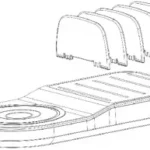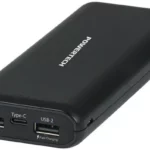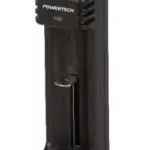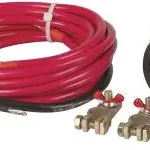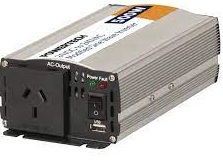
POWERTECH Modified Sine Wave Inverter User Manual
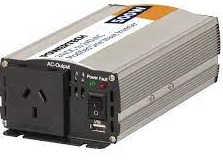
Important
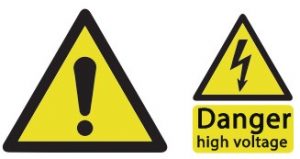
Please read and understand this manual before installing and using this inverter.
DANGER! High voltages inside; do not open the inverter case while power is connected.
Do not connect to equipment that exceeds the
Permanent damage may occur that will not be covered by the warranty.
Types of inverter
There are 2 types of inverters available for use in consumer applications. These are:
Pure Sine Wave Inverters:
The name “pure sine wave” inverter comes from the wave form of its output, as shown in the above diagram. This is identical to or replicates as closely as possible the normal AC mains. As most electronic products are designed to be powered by sine wave AC, pure sine wave inverters are suitable for all applications, especially motorized devices where it is proven that pure sine wave power will lengthen the product’s lifetime and run much quieter. Pure sine wave inverters are more expensive than modified sine wave inverters because they involve a much more complicated design in order to simulate the smooth sine wave output of standard mains power.
Modified Sine Wave Inverters:
Again, modified sine wave are named after their output waveform. The output of the modified sine wave inverter cycles through positive, ground and negative voltage as shown in the diagram above, to give a rough approximation of a sine wave.
Modified sine wave inverters are a cheaper alternative to pure sine wave inverters as they don’t require the complicated system needed to smooth and render the output waveform. The main down side with a modified sine wave is that it can introduce electrical noise (buzzing) to inductive and A-V equipment. This is caused by the fast reversal of the output voltage 100 times per second. However, modified sine wave inverters are OK for heat element devices (kettle, heaters, etc) and devices that have an external or built-in adaptor (laptop, TV, etc).

- Inductive loads such as microwave ovens run faster, quieter, cooler and more efficiently on pure sine wave.
- Pure sine wave reduces audible and electrical noise (buzzing) in fans, fluorescent lights, audio amplifiers, TVs etc
- Pure sine wave prevents crashes in computers, glitches and noise in monitors
- Pure sine wave reliably powers the following devices that normally won’t work with modified sine wave inverters:
- Laser printers, photocopiers, magneto-optical hard drives.
- Some fluorescent lights with old-type ballasts.
- Power tools using variable speed controllers AC motors.
- Sewing machines with speed/microprocessor control.
- Battery chargers

- Place the inverter on a reasonably flat surface, either horizontally or vertically.
- The inverter should not be installed in the enginer compartment, due to possible water/oil/acid contamination, and excessive heat under the bonnet, as well as potential danger from petrol fumes and the spark that an inverter can occassionally produce. It’s best to run battery cables to a dry, cool mounting location.
- Keep the inverter dry. Do not expose it to rain or moisture. DO NOT operate the inverter if the inverter, the device being operated, or any other surfaces that may come in contact with any power source are wet. Water and many other liquids can conduct electricity which may lead to serious injury or death.
- Do not operate the inverter in dusty environments. Keep the fan clean and free of dust.
- Avoid placing the inverter on or near heating vents, radiators or other sources of heat. Do not place the inverter in direct sunlight. Ideal operating temperature is between 10°C and 30°C. Allow at least 2 inches (5cm) of air space on all sides of the
temperatures. - In order to properly disperse heat generated while the inverter is in operation, keep it well ventilated. While in use, maintain several inches of clearance around the top and sides of the inverter.
- DO NOT install inverters in unvented battery compartments
- DO NOT expose the inverter to temperatures exceeding 40°C
- DO NOT connect live AC power to the inverter’s AC outlets. The inverter will be damaged even if it is switched OFF.
CAUTION: Any internal adjustment on the inverter is prohibited. Do not disassemble.
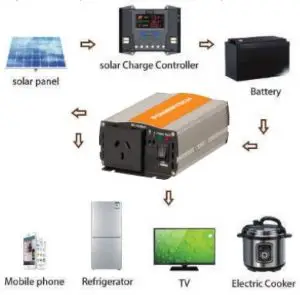
Specifications
| AC Output | |
| Power: | 500W |
| Surge Power: | 1500W |
| Output Waveform | Modified sine wave (THD<3%) |
| Output Frequency: | 50Hz±0.1% |
| AC Output Voltage: | 200~240VAC |
| DC Input | |
| Voltage: | 12V DC |
| Voltage Range: | 10V-15V |
| Low Voltage Alarm: | 10.5V± 0.5V |
| Low Voltage Shutdown: | 10V±0.5V |
| Over Voltage Shutdown: | 15V±0.5V |
| Converting Max.Efficiency. | 90%(Full Loading)/95%(1/3 Loading |
| No Load Consumption: | < 0.7A |
| Protection: | Overload, Input Reverse Polarity |
| USB Output: | 5VDC @2A Max |
| Dimensions: | 182(L) x 105(W) x 60(H)mm |
